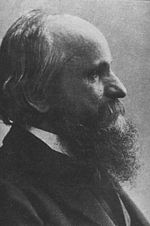Alexius Meinong
Alexius Meinong (July 17, 1853 - November 27, 1920) was an Austrian philosopher.
Life
Meinong was born in Lemberg, Austria (now L'viv in Ukraine) and died in Graz, Austria. He studied at the Academic Gymnasium, Vienna and later the University of Vienna where he read history and philosophy as a pupil of Franz Brentano. He was professor and Chair of Philosophy at the University of Graz where he founded the Graz psychological institute (in 1894) and the Graz School of experimental psychology.
Meinong supervised the promotion of Christian von Ehrenfels (founder of Gestalt psychology), as well as the habilitation of Alois Höfler and Anton Oelzelt-Newin.
Work
He is most noted for his Theory of Objects (Über Gegenstandstheorie, 1904) which grew out of his work on intentionality and his belief in the possibility of intending nonexistent objects. The theory is based around the purported empirical observation that it is possible to think about something, such as a golden mountain, even though that object does not exist. Historically, Meinong has been treated as an eccentric who was dealt a well-deserved death blow in Bertrand Russell's famous essay "On Denoting", especially by Gilbert Ryle. However, Russell himself spoke (and wrote) highly of the vast majority of Meinong's work. Further, Meinongians such as Terence Parsons and Roderick Chisholm established the consistency of a Meinongian theory of objects, while others (e.g., Karel Lambert) have defended the usefulness of such a theory.
Meinong is also controversial in the field of Philosophy of Language for his views on existence. Meinong posits that "existence" is merely a property of an object, just as color or mass might be a property. Thus, according to Meinong, a figure such as Sherlock Holmes would lack the property of existence, just as Sherlock Holmes lacks the property of being a female.
Literature
Primary
Books
- Meinong, A. (1885). Über philosophische Wissenschaft und ihre Propädeutik
- Meinong, A. (1894). Psychologisch-ethische Untersuchung zur Werttheorie
- Meinong, A., ed. (1904). Untersuchung zur Gegenstandstheorie und Psychologie
- Meinong, A. (1910). Über Annahmen, 2nd ed.
- Meinong, A. (1915). Über Möglichkeit und Wahrscheinlichkeit
- Meinong, A. (1917). Über emotionale Präsentation
Articles
- Meinong, A. (1877). "Hume Studien I. Zur Geschichte und Kritik des modernen Nominalismus" in Sitzungsbereiche der phil.-hist. Classe der kais. Akademie der Wissenschaften, 78:185-260.
- Meinong, A. (1882). "Hume Studien II. Zur Relationstheorie" in Sitzungsbereiche der phil.-hist. Classe der kais. Akademie der Wissenschaften, 101:573–752.
- Meinong, A. (1891). "Zur psychologie der Komplexionen und Relationen" in Zeitschrift für Psychologie und Physiologie der Sinnesorgane, II:245–265.
- Meinong, A. (1899). "Über Gegenstände höherer Ordnung und deren Verhältniss zur inneren Wahrnehmung" in Zeitschrift für Psychologie und Physiologie der Sinnesorgane, 21, pp. 187-272.
Books together with other authors
- Höfler, A. and Meinong, A. (1890). Philosophische Propädeutik. Erster Theil: Logik. F. Tempsky / G. Freytag, Vienna.
Posthumously edited works
- Haller, R., Kindinger, R., and Chisholm, R., editors, (1968-78.) Gesamtausgabe, 7 vols., Akademische Druck- und Verlagsgesellschaft, Graz.
- Meinong, A. (1965). Philosophenbriefe, ed. Kindinger, R., Akademische Druck- und Verlagsanstalt, Graz.
Secondary
Books
- Albertazzi, L., Jacquette, D., and Poli, R., editors (2001). The School of Alexius Meinong. Ashgate, Aldershot.
- Chisholm, R. (1982). Brentano and Meinong Studies. Rodopi, Amsterdam.
- Dölling, E. (1999). Wahrheit Suchen und Wahrheit Bekennen. Alexius Meinong: Skizze seines Lebens. Rodopi, Amsterdam - Atlanta.
- Findlay, J. N. (1963). Meinong's Theory of Objects and Values, 2nd ed. Oxford, Clarendon Press.
- Grossman, R. (1974). Meinong. Routledge & Kegan Paul, London - Boston.
- Haller, R., editor (1972). Jenseits von Sein und Nichtsein. Akademische Druck- und Verlagsanstalt, Graz.
- Lindenfeld, D. F. (1980). The Transformation of Positivism: Alexius Meinong and European Thought, 1880-1920. University of California Press, Berkeley/Los Angeles/London.
- Rollinger, R. D. (1993). Meinong and Husserl on Abstraction and Universals. Number XX in Studien zur Österreichischen Philosophie. Rodopi, Amsterdam – Atlanta.
Articles
- Chrudzimski, A. (2005). "Abstraktion und Relationen beim jungen Meinong". In [Schramm, 2005], pages 7–62.
- Dölling, E. (2005). "Eine semiotische Sicht auf Meinongs Annahmenlehre". In [Schramm, 2005], pages 129–158.
- Kenneth, B. (1970). "Meinong’s Hume Studies. Part I: Meinong’s Nominalism". in Philosophy and Phenomenological Research, 30:550–567.
- Kenneth, B. (1971). "Meinong’s Hume Studies. Part II: Meinong’s Analysis of Relations". in PPR, 31:564–584.
- Rollinger, R. D. (2005). "Meinong and Brentano". In [Schramm, 2005], pages 159–197.
- Schermann, H. (1972). "Husserls II. Logische Untersuchung und Meinongs Hume-Studien I. In [Haller, 1972], pages 103–116.
Journals
- Schramm, A., editor (2005). Meinong Studies - Meinong Studien, Vol. I, Ontos Verlag. (yearly periodical)
See also
- Ontology
- Philosophical realism
External links
de:Alexius Meinong es:Alexius Meinong fr:Alexius Meinong it:Alexius Meinong ja:アレクシウス・マイノング pl:Alexius Meinong pt:Alexius Meinong
Credits
New World Encyclopedia writers and editors rewrote and completed the Wikipedia article in accordance with New World Encyclopedia standards. This article abides by terms of the Creative Commons CC-by-sa 3.0 License (CC-by-sa), which may be used and disseminated with proper attribution. Credit is due under the terms of this license that can reference both the New World Encyclopedia contributors and the selfless volunteer contributors of the Wikimedia Foundation. To cite this article click here for a list of acceptable citing formats.The history of earlier contributions by wikipedians is accessible to researchers here:
The history of this article since it was imported to New World Encyclopedia:
Note: Some restrictions may apply to use of individual images which are separately licensed.
